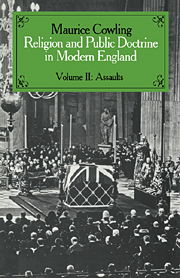Book contents
- Frontmatter
- Foreword
- Contents
- Projected contents of Volume III (for publication c. 1988–90)
- INTRODUCTION
- I THE ASSAULT ON THE EIGHTEENTH CENTURY
- II THE ASSAULT ON CHRISTIANITY
- 5 Types of Ethical Earnestness I
- 6 Types of Ethical Earnestness II
- 7 Types of Ethical Earnestness III
- III THE ASSAULT ON CHRISTIANITY IN THE TWENTIETH CENTURY
- IV ASSAULTS ON THE ASSAILANTS
- CONCLUSION: ASSAULTS AND ACCOMMODATIONS
- Notes
- Index of main names
6 - Types of Ethical Earnestness II
Published online by Cambridge University Press: 23 December 2009
- Frontmatter
- Foreword
- Contents
- Projected contents of Volume III (for publication c. 1988–90)
- INTRODUCTION
- I THE ASSAULT ON THE EIGHTEENTH CENTURY
- II THE ASSAULT ON CHRISTIANITY
- 5 Types of Ethical Earnestness I
- 6 Types of Ethical Earnestness II
- 7 Types of Ethical Earnestness III
- III THE ASSAULT ON CHRISTIANITY IN THE TWENTIETH CENTURY
- IV ASSAULTS ON THE ASSAILANTS
- CONCLUSION: ASSAULTS AND ACCOMMODATIONS
- Notes
- Index of main names
Summary
‘You who have escaped from the religions … of the world … into the high-and-dry light of the intellect may deride them; but in so doing you deride accidents of form merely, and fail to touch the immovable basis of the religious sentiment in the nature of man. To yield this sentiment reasonable satisfaction is the problem of problems at the present hour. And grotesque in relation to scientific culture as many of the religions of the world have been and are – dangerous, nay destructive, to the dearest privileges of freemen as some of them undoubtedly have been, and would, if they could, be again – it will be wise to recognize them as the forms of a force, mischievous, if permitted to intrude on the region of knowledge, over which it holds no command, but capable of being guided to noble issues in the region of emotion, which is its proper and elevated sphere.’
John Tyndall Address Delivered before the British Association Assembled at Belfast 1874 pp. 60–1.‘The problem which presses for solution is, how, amid the wreck of forms now imminent, to preserve the reverence and loftiness of thought and feeling which in times past found in those forms organic expression. This is not to be done by science only, still less by routine utterances about God and the human soul. From “society”, or from aggregates of men in societies, whether “Christian” or otherwise, no voice of guidance as regards this question can possibly come. […]
- Type
- Chapter
- Information
- Religion and Public Doctrine in Modern England , pp. 141 - 158Publisher: Cambridge University PressPrint publication year: 1985



